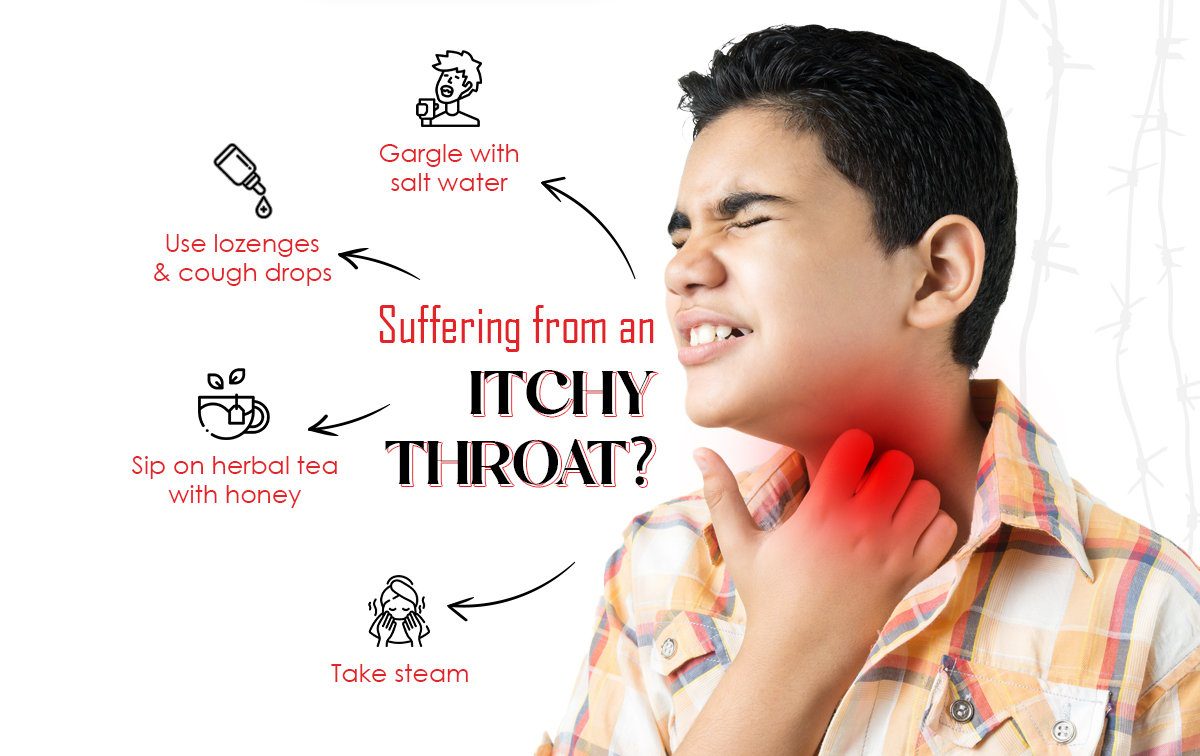An itchy throat is a common yet often overlooked symptom that can signal anything from mild irritation to underlying health conditions. Whether it’s triggered by allergies, dry air, infections, or environmental pollutants, understanding the causes and treatments for an itchy throat can help you find fast relief and prevent recurrence. This guide explores the symptoms, causes, and proven remedies for throat itchiness.

What Is an Itchy Throat?
An itchy throat refers to a tickling, scratchy sensation that often prompts coughing or throat clearing. It may be accompanied by dryness, mild pain, or swelling, depending on the underlying cause.
Common Descriptions of Throat Itchiness
- Persistent urge to clear the throat
- Scratchy or dry feeling in the throat
- Mild swelling or irritation
- Sensation worsens at night or in dry environments
Causes of an Itchy Throat
Understanding the root cause is essential for effective treatment. Here are the most common triggers:
Allergies
Allergic reactions are among the leading causes of throat itchiness. Common allergens include:
- Pollen (seasonal allergic rhinitis)
- Pet dander
- Mold spores
- Dust mites
- Certain foods (e.g., nuts, dairy, strawberries)
Allergies often present with additional symptoms like sneezing, nasal congestion, itchy eyes, and postnasal drip.
Viral and Bacterial Infections
Infections such as the common cold, flu, or strep throat can begin with an itchy throat before progressing to soreness and inflammation.
- Viral infections: Often accompanied by cough, fatigue, and congestion
- Bacterial infections: May include fever, swollen lymph nodes, and painful swallowing
Dry Air and Environmental Irritants
Exposure to dry indoor air, smoke, or chemical fumes can dry out the throat lining and cause irritation.
- Tobacco smoke
- Cleaning products
- Air conditioning or heating systems
- Pollution and exhaust fumes
Acid Reflux
Gastroesophageal reflux disease (GERD) can cause stomach acid to back up into the throat, leading to irritation and itchiness.
- Often worse after meals or when lying down
- May include heartburn, coughing, or hoarseness
Dehydration
Insufficient fluid intake can dry out mucous membranes, making the throat feel itchy and uncomfortable.
Symptoms Associated With an Itchy Throat
While the primary symptom is itchiness, other signs may help identify the cause:
Related Symptoms
- Dry cough
- Sneezing or nasal congestion
- Swollen throat or glands
- Difficulty swallowing
- Hoarseness or voice changes
- Runny nose or postnasal drip
If symptoms persist or worsen, medical evaluation may be necessary to rule out serious conditions.
How to Treat an Itchy Throat
Treatment depends on the underlying cause. Here are the most effective remedies:
Home Remedies
- Saltwater Gargle: Mix 1/2 teaspoon of salt in warm water and gargle several times daily.
- Honey: A spoonful of honey or honey in warm tea can soothe irritation.
- Hydration: Drink plenty of water to keep the throat moist.
- Steam Inhalation: Use a humidifier or take a steamy shower to relieve dryness.
- Herbal Teas: Chamomile, ginger, or licorice root teas can reduce inflammation.
Over-the-Counter Medications
- Antihistamines: For allergy-related itchiness (e.g., loratadine, cetirizine)
- Throat Lozenges: Provide temporary relief and increase saliva production
- Cough Syrups: Help suppress dry cough and soothe the throat
- Nasal Sprays: Reduce postnasal drip and inflammation
Medical Treatments
If home remedies and OTC medications don’t help, consult a healthcare provider. Possible treatments include:
- Prescription antihistamines or corticosteroids
- Antibiotics for bacterial infections
- Acid reflux medications (e.g., proton pump inhibitors)
- Allergy testing and immunotherapy
Prevention Tips
Preventing an itchy throat involves minimizing exposure to triggers and maintaining good health habits.
Preventive Measures
- Avoid known allergens and irritants
- Use air purifiers and humidifiers
- Stay hydrated throughout the day
- Wash hands frequently to prevent infections
- Avoid smoking and secondhand smoke
- Monitor indoor air quality
When to See a Doctor
Seek medical attention if your itchy throat is accompanied by:
- Difficulty breathing or swallowing
- High fever
- Persistent or worsening symptoms
- Swelling of the face, lips, or tongue
- Rash or hives
These may indicate a serious allergic reaction or infection requiring immediate care.
Final Thoughts
An itchy throat is usually a minor symptom, but it can signal a range of health issues from allergies to infections. By identifying the cause and applying targeted remedies, you can relieve discomfort and prevent future episodes. If symptoms persist, don’t hesitate to consult a healthcare professional for a proper diagnosis and treatment plan.






















